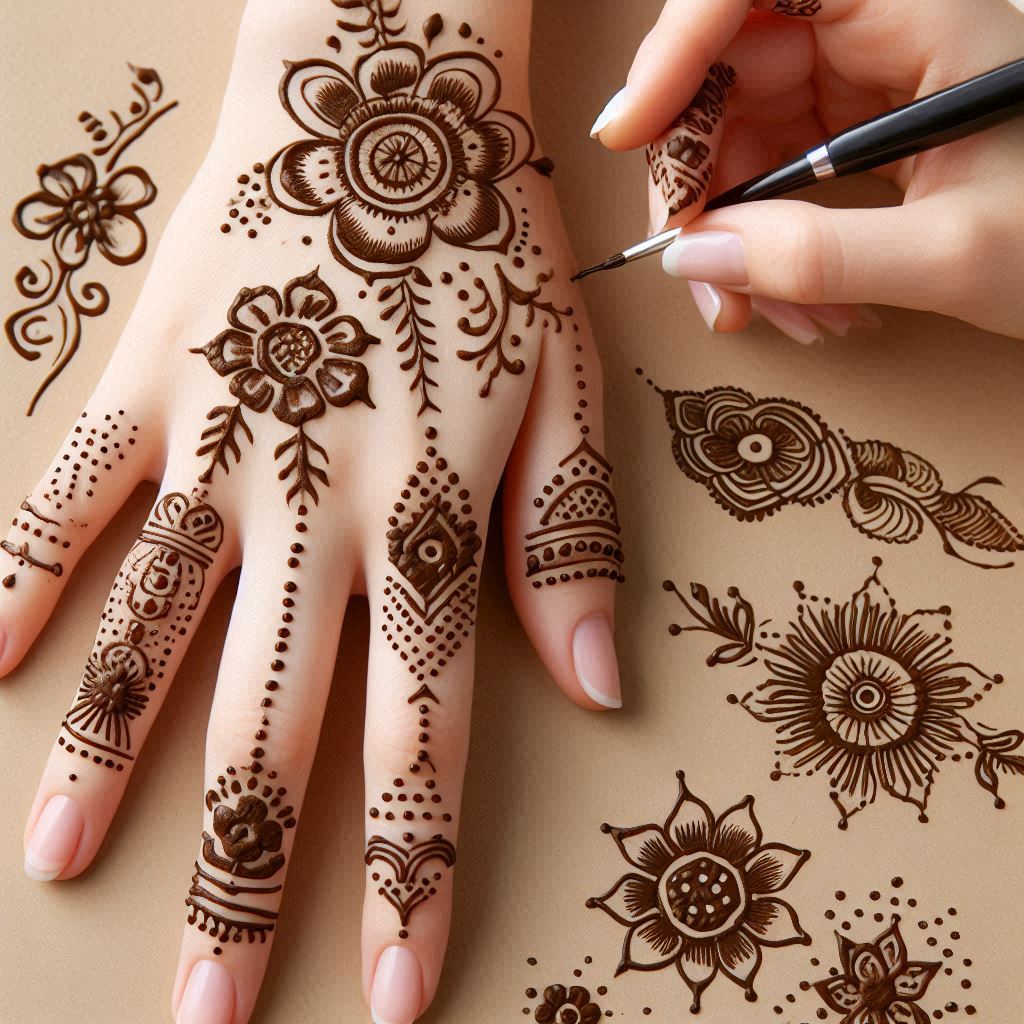Bail Mehndi Designs on the Back Hand: A Dance of Elegance and Art
There’s something captivating about how Mehndi transforms the hand into a canvas for artistic expression. The Bail design, with its graceful, trailing lines and delicate curves, is a perfect example of this transformation, especially when applied to the back of the hand. As I’ve often found in my work with sculpture, it’s the way art interacts with the form of the human body that truly brings it to life. The Bail Mehndi design is no different – it moves with the body, flowing across the hand like a vine, enhancing the natural beauty of the skin beneath.
I’ve always been drawn to the interplay between the solid and the fluid, the fixed and the dynamic. The Bail design, with its slender, swirling tendrils, evokes this sense of movement. Just as in sculpture, where each line and curve must complement the form it adorns, the Bail Mehndi design uses the hand’s contours to create a piece of living, breathing art.
The Beauty of Movement and Flow
One of the things I love most about the Bail design is how it mimics the natural world. The word “Bail” itself means “vine,” and just like a vine that wraps around a tree or climbs up a wall, the Mehndi design winds its way across the hand, following its unique structure. Starting from the wrist and winding up to the fingers, the Bail design is light, airy, and full of space, allowing the skin to peek through the delicate lines.
This sense of movement is key to what makes the design so captivating. As the hand moves, so too does the design. The vine-like patterns shift and change with every gesture, much like how a sculpture’s appearance can change depending on the angle it’s viewed from. There’s a kind of dialogue between the Mehndi and the hand itself – as if the design is alive, in constant conversation with the body.
I often think about how art and form are inseparable. In my sculptures, I’m always conscious of how a piece will interact with its environment and how it will be perceived from different perspectives. Mehndi artists, too, must consider how their designs will move with the hand, how the lines will change as the fingers open and close. The Bail design, with its flowing lines and organic shapes, perfectly embodies this idea of art in motion.
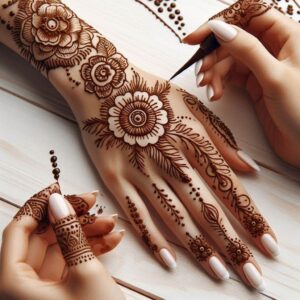
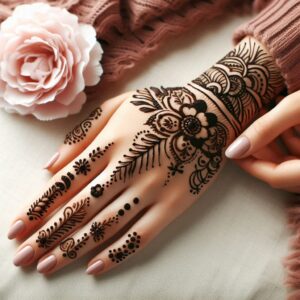
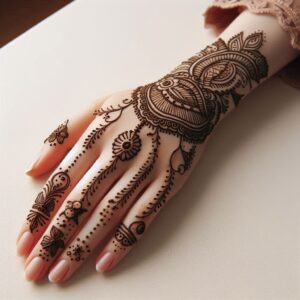
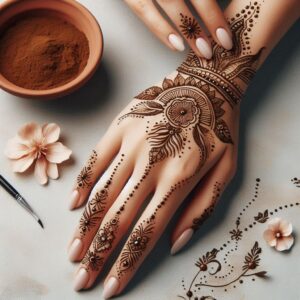
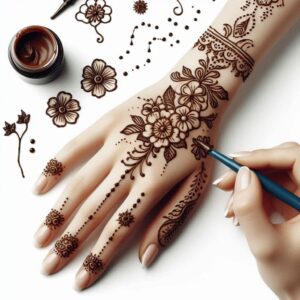
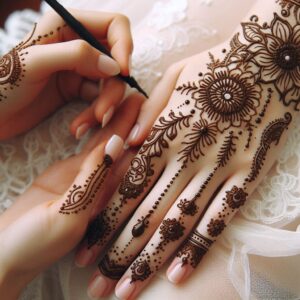
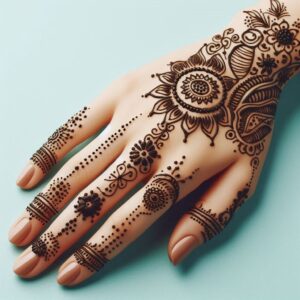
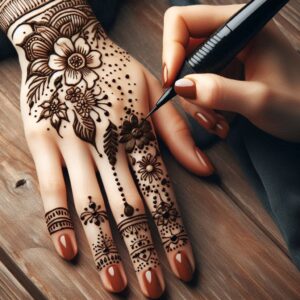
A Subtle Balance of Space and Detail
Unlike some of the more densely packed Mehndi styles, the Bail design allows for plenty of negative space. It’s this balance between the detailed lines and the open areas of skin that gives the design its elegance. Much like how negative space in sculpture can define the form as much as the solid material itself, the spaces left bare in a Bail Mehndi design are just as important as the lines that are drawn. They allow the eye to rest, to appreciate the intricacy of the design without becoming overwhelmed.
The back of the hand provides a unique canvas for this type of Mehndi. With its flat, open surface and the natural lines that run from wrist to fingertip, the hand invites the flowing nature of the Bail design. The artist’s challenge – and indeed, their skill – lies in knowing where to add detail and where to leave space, creating a design that is both intricate and breathable.
This approach mirrors my own experiences with sculpture, where the balance between form and void is critical to the final piece. In Mehndi, as in sculpture, it’s the relationship between what is there and what is not that creates harmony and beauty. The Bail design, with its fine, trailing lines, strikes this balance perfectly, making it both simple and sophisticated.
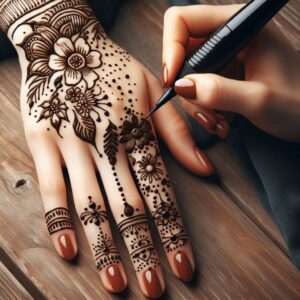
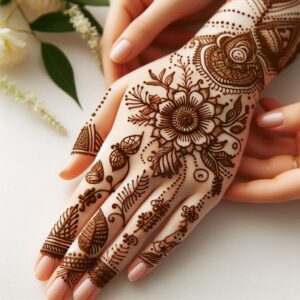
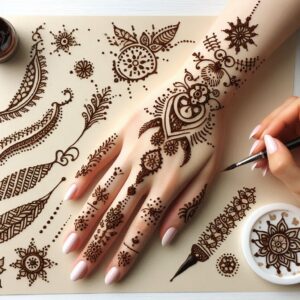
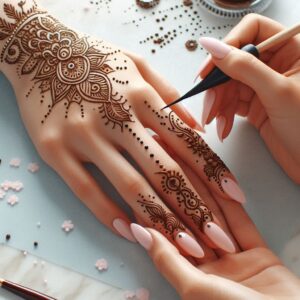
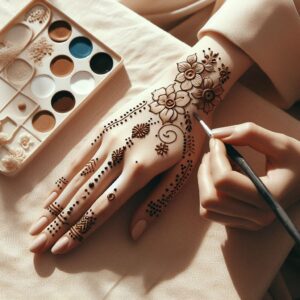
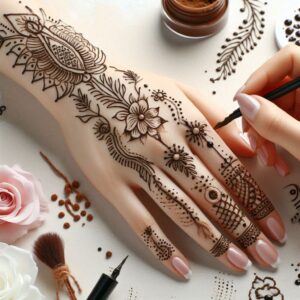
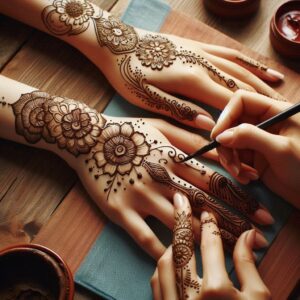
Mehndi as a Living Art Form
What fascinates me most about Mehndi, and the Bail design in particular, is how it transforms the body into a living, evolving work of art. Much like the process of sculpture, where the material is shaped and molded into form, Mehndi is a practice of creation, where the lines and curves are carefully placed to enhance the body’s natural beauty. But unlike sculpture, which remains static once completed, Mehndi is dynamic – it changes, fades, and eventually disappears, leaving only the memory of the design behind.
The Bail Mehndi design reflects this transience beautifully. Its light, flowing nature feels like it was meant to move, to change with the wearer. As the hand shifts, the vine-like patterns appear to grow, emphasizing the connection between art and life. This idea of impermanence is something I often contemplate in my own work – the knowledge that art, like life, is fleeting, but its impact can be lasting.
For the wearer, the experience of Mehndi is deeply personal. It’s a ritual of connection – to tradition, to culture, to self. Each design is unique, tailored to the individual, much like how each sculpture I create is a reflection of a particular moment, a specific emotion. The Bail design, in its simplicity and elegance, allows for this personal connection to shine through, making it an ideal choice for those who want to celebrate their individuality through art.
Conclusion: A Design That Embodies Elegance
In the world of Mehndi, the Bail design stands out for its elegance, its lightness, and its ability to transform the back of the hand into a work of art. It’s a design that flows with the body, celebrating the natural beauty of the hand while adding a layer of artistic expression that feels both timeless and modern.
For me, as an artist, this design resonates on a deeper level. It speaks to the idea that art is not just something we observe but something we experience – it’s in the way the hand moves, the way the lines of the Mehndi interact with the skin, the way the design lives and breathes with the wearer. It’s this sense of movement, of life, that makes the Bail Mehndi design so captivating, so meaningful.
Keep Exploring Mehndi Art:
- Rajasthani full hand Mehndi design – Dive into the intricate world of Rajasthani Mehndi, where tradition and artistry come together to create deeply symbolic designs.
- Arabic Mehndi designs front hand – Discover the bold and flowing lines of Arabic Mehndi on the front hand, where elegance meets cultural expression.
